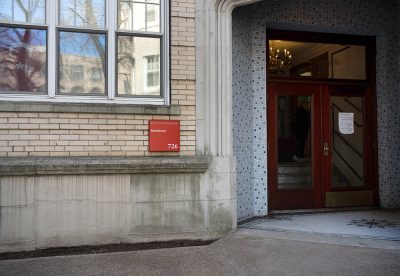
By Artemis Huang and Fiona Broadie
Boston University raised its 2022-2023 academic year traditional-style residence rates by an average of $460 per student compared to last year. The cost of a dining plan — which all traditional-style residents are required to get — similarly increased by $290 over the same period.
Costs have been increasing steadily over nearly a decade at least, both at BU and in the greater Boston area. But for many, the increase in BU housing’s prices is making the option of living off-campus increasingly more attractive.
“That’s a part of my decision for next year to go off-campus completely,” said Julia Concannon, a sophomore in the College of Arts and Sciences. “To go off campus, it depends on the area that you’re living in, but generally, it tends to be so much less expensive.”
Previously, the University’s average cost for its on-campus, traditional-style residences had increased at a rate of approximately 3% per year — the only exception being 2021-2022 academic year when rates increased by 1.47%.
This year, rates increased by the highest percent change in at least the last seven years — 3.86%.
BU spokesperson Colin Riley said housing prices reflect inflation and the costs of operating 11,000 beds across more than 140 student residences. These costs include supply, goods and services, salaries and benefits, maintenance and staffing.
Inflation has hit a 40-year high — reaching 7.9% over the past year, according to data from the Consumer Price Index — amid turmoil in Ukraine and the lasting economic effects of the COVID-19 pandemic.
“They [BU Housing] look at the cost and budget needs … and forward that information up to senior leadership that then looks at the entire University operating budget,” Riley said.
Excluding dining plan costs, a single room in a suite — a shared living space that includes a private bathroom — in 33 Harry Agganis Way will cost approximately $2,100 a month, and a standard minimum rate room — that is, a room with two, three or four beds, with no kitchen and a shared bathroom — will cost a little more than $1,500 a month.
However, the average cost of renting a room in a three-bedroom apartment in Boston would come out at around $1,050 a month, and a studio apartment in Allston has an average monthly rent of approximately $1,700, according to data from Boston Pads, an apartment rental agency based in Boston.
CAS freshman Bhagat Khanna, who resides in a triple room on Bay State Road, said he wasn’t aware of the price change.
“I understand that housing may increase in price and that’s, in some way, maybe out of my control,” he said. “I would at least have wanted to be aware of it in some way… I think communication at least should be a minimum.”
Alina Karimova, a freshman in the College of Communication, said she does not agree with the increasing housing rates given there are issues with plumbing, shower and heating in her residence at Warren Towers.
“I am here on scholarship… I don’t come from a rich family,” she said. “Sometimes I have questions of where that money is going.”
In a Dec. 2021 interview with The Daily Free Press, BU President Robert Brown mentioned the school is aware that some buildings around campus are in need of renovations.
“We have 380 buildings. Some are new and some that very much need renovation,” he said. “We spend a lot of time thinking about and getting a lot of input about how we deploy the limited amount of resources we have to move forward.”
Joshua Goodman, associate professor of Economics and Education at BU, said the University’s increasing housing costs fall in line with the general trend in Boston of housing becoming “substantially more expensive”.
“I think what [BU] should probably do is think about ways in particular to protect more economically vulnerable students,” Goodman said.
After adjusting for inflation, the median rent in Boston has increased 29.11% since 2000, according to recent federal housing data compiled by iPropertyManagement. On March 11, Boston Mayor Michelle Wu announced a Rent Stabilization Advisory Committee to propose rent control legislation in Boston.
Goodman said long-term solutions to housing cost problems lie beyond BU’s capabilities.
“Massachusetts and Boston particularly need a much smarter housing policy and in particular need to stop preventing the building of many more units of housing.”
Despite Boston’s housing problems, some BU students still think increasing housing prices each year is unreasonable.
“It’s inequitable for housing to continually be more expensive,” Concannon said. “I hope that they can somehow figure out a solution to mitigate the cost of housing for students.”
Correction: A previous version of this article calculated monthly on-campus housing rates including the intersession period. Boston University charges extra for intersession. The statistics provided have been updated to exclude intersession and take into account only the seven-and-a-half months students are on campus.




















































































































